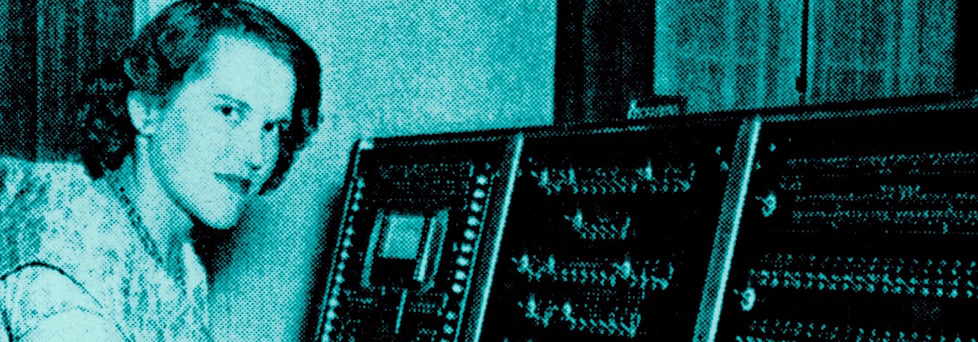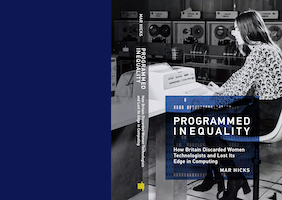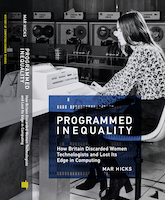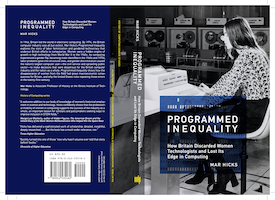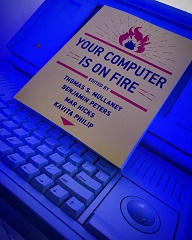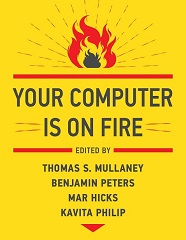Below you will find short, medium, and long format bios. Please use whichever one, or combination, is best suited to your needs. Scroll further down the page for a headshot and other images that you can use on talk posters or publicity related to the event that Mar will be doing at your institution or corporation.
Short Bio:
Mar Hicks is an author, historian, and professor doing research on hidden histories of computing, as well as the history of labor and technology. Hicks is currently an Associate Professor at The University of Virginia's School of Data Science, in Charlottesville, teaching courses on the history of technology, computing and society, and the larger implications of powerful and widespread digital infrastructures. Their research focuses on how gender and sexuality bring hidden technological dynamics to light, and how the experiences of women and LGBTQIA people change the core narratives of the history of computing in unexpected ways. Hicks's multiple award-winning book, Programmed Inequality, looks at how the British lost their early lead in computing by discarding women computer workers, and what this cautionary tale tells us about current issues in high tech. Their new work looks at resistance and queerness in the history of technology. Hicks is also co-editor of the book Your Computer Is On Fire (MIT Press, 2021), a volume of essays about how we can begin to fix our broken high tech infrastructures. Other writing and more information can be found at: marhicks.com.
Medium Bio:
Mar Hicks is an author, historian, and professor doing research on hidden histories of computing, as well as the history of labor and technology. Their research focuses on how gender and sexuality bring hidden technological dynamics to light, and how the experiences of women and LGBTQIA people change the core narratives of the history of computing in unexpected ways.
Hicks's book, Programmed Inequality: How Britain Discarded Women Technologists and Lost Its Edge In Computing, published by MIT Press, won the 2018 PROSE Award for History of Science, Technology, and Medicine; the 2018 Sally Hacker Prize from the Society for the History of Technology; the 2018 Stansky Prize from the North American Conference on British Studies; the 2018 Wadsworth Prize, awarded by the British Business Archives Council; and, the 2019 Herbert Baxter Adams Prize from the American Historical Association. Programmed Inequality is a cautionary tale that investigates why the proportion of women declined as electronic computing matured, and how this labor situation had grave effects on the technological aspirations of that waning superpower. It shows what lessons this holds for other nations, especially the United States, and how history can help us make sense of the present and the future by focusing not just on technological success stories, but also stories of technological failure.
Hicks is currently an Associate Professor at The University of Virginia's School of Data Science, in Charlottesville, teaching courses on the history of technology, computing and society, and the larger implications of powerful and widespread digital infrastructures. In 2018-2019 Hicks was also a fellow at the National Humanities Center, working on a new book about the prehistory of trans algorithmic bias, the gendered nature of digital infrastructure, and the intersections between queerness and resistance in the history of digital computing. Hicks is also co-editor of the book Your Computer Is On Fire (MIT Press, 2021), a volume of essays about how we can begin to fix our broken high tech infrastructures. Other writing and more information can be found at: marhicks.com.
Check their twitter feed for upcoming events or read more about their work at marhicks.com.
Long Bio:
Mar Hicks is an author, historian, and professor doing research on the history of computing, labor, technology, and queer science and technology studies. Their research focuses on how gender and sexuality bring hidden technological dynamics to light, and how the experiences of women and LGBTQIA people change the core narratives of the history of computing in unexpected ways.
Hicks's book, Programmed Inequality: How Britain Discarded Women Technologists and Lost Its Edge In Computing, published by MIT Press, won the 2018 PROSE Award for History of Science, Technology, and Medicine; the 2018 Sally Hacker Prize from the Society for the History of Technology; the 2018 Stansky Prize from the North American Conference on British Studies; the 2018 Wadsworth Prize, awarded by the British Business Archives Council; and, the 2019 Herbert Baxter Adams Prize from the American Historical Association. Programmed Inequality is a cautionary tale that investigates why the proportion of women declined as electronic computing matured, and how this labor situation had grave effects on the technological aspirations of that waning superpower. It shows what lessons this holds for other nations, especially the United States, and how history can help us make sense of the present and the future by focusing not just on technological success stories, but also stories of technological failure. It is available in hardcover, paperback, audiobook, and e-book—and it may also soon be available in graphic novel format.
Maria Klawe, President of Harvey Mudd College and an expert on diversity in STEM, has described the book as "one of the best researched and most compelling examples of the negative impact of gender and class discrimination on a country's economy." Margot Shetterly, author of Hidden Figures, has called it an "important lesson for scholars and policymakers seeking ways to improve inclusion in STEM fields."
Hicks writes for a number of academic and popular publications on topics ranging from computer dating to labor rights and has shared their expertise by giving talks at universities, corporations, and conferences around the world, in addition to being a frequent guest on BBC Radio, NPR, and tech podcasts.
Hicks earned a BA from Harvard in Modern European History, and a Ph.D. and MA from Duke University in History, along with a graduate certificate in Women's, Gender, and Sexuality Studies. Before becoming a professor, they worked as a UNIX systems administrator for the Department of Electrical Engineering and Computer Science at Harvard.
Hicks is currently an Associate Professor at The University of Virginia's School of Data Science, in Charlottesville, teaching courses on the history of technology, computing and society, and the larger implications of powerful and widespread digital infrastructures. Previously Hicks taught at Illinois Institute of Technology and the University of Wisconsin-Madison. In 2018-2019 they were a fellow at the National Humanities Center, working on a new book about the prehistory of trans algorithmic bias, the gendered nature of digital infrastructure, and the intersections between queerness and resistance in the history of digital computing. Hicks is also co-editor (with Kavita Philip, Ben Peters, and Tom Mullaney) of the book Your Computer Is On Fire (MIT Press, 2021), a volume of essays about how we can begin to fix our broken high tech infrastructures. Check their twitter feed for upcoming events or read more about their work at marhicks.com.
Photos:

